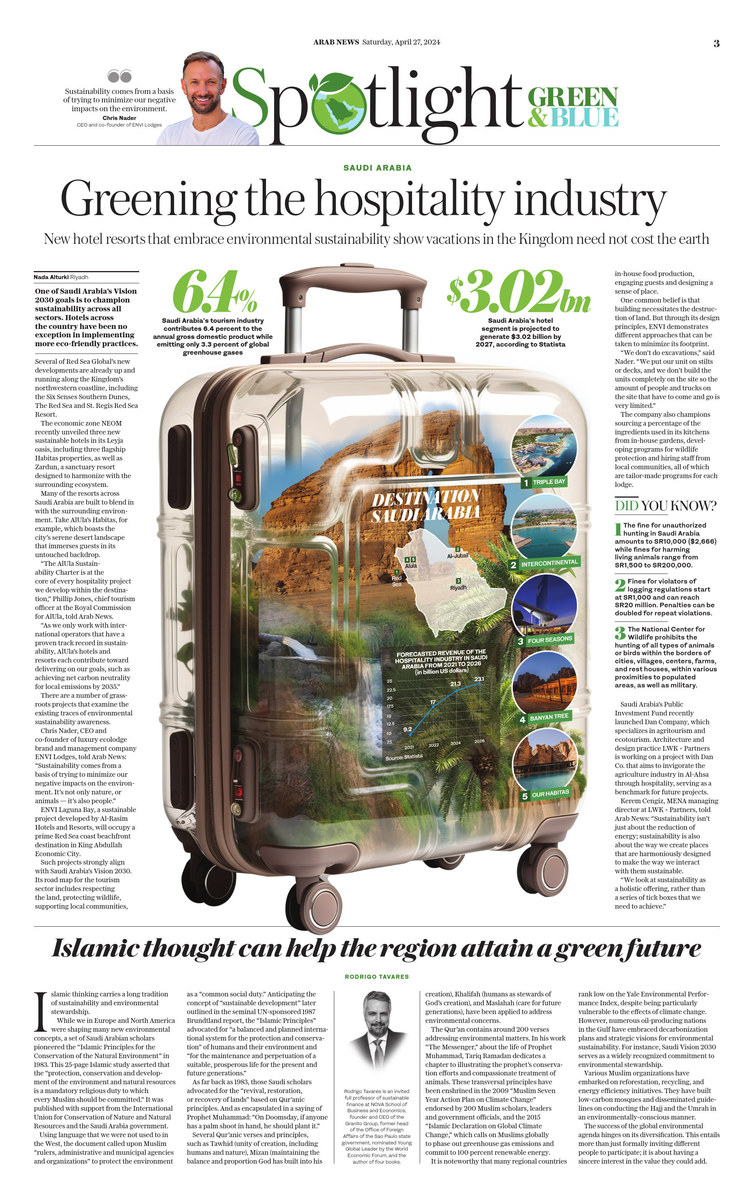Islamic thought can help the region attain a green future

https://arab.news/w6aqy
US Treasury Secretary Janet Yellen’s recent visit to China underscored the urgency of addressing climate change. While she expressed concerns about the adequacy of China’s efforts in combating this existential threat, Chinese officials asserted their commitment to their own vision of sustainability encapsulated in the concept of “Ecological Civilization.”
This vision seeks to harmonize economic prosperity with ecological preservation over a century-long period. While the Joe Biden administration’s Western approach draws inspiration from seminal works including “Small is Beautiful” by E.F. Schumacher and “Silent Spring” by Rachel Carson, China’s perspective is deeply entrenched in indigenous philosophies such as Taoism and Confucianism. These two views on sustainability are not irreconcilable, but they are distinct.
Over the past half-century, less established environmental perspectives have often been met with wariness rather than recognized as valuable indigenous wisdom deserving documentation, amplification, and integration into a comprehensive global framework rooted in bulletproof science, and which should be embraced by communities worldwide, all of whom should feel directly impacted by climate change issues and recognize their role as part of the solution.
Take, for instance, Islamic thinking, which carries a long tradition of sustainability and environmental stewardship. While we in Europe and North America were shaping many new environmental concepts, a set of Saudi Arabian scholars pioneered the “Islamic Principles for the Conservation of the Natural Environment” in 1983.
This 25-page Islamic study, which proved influential in shaping policies across various Muslim states, asserted that the “protection, conservation and development of the environment and natural resources is a mandatory religious duty to which every Muslim should be committed.” It was published with support from the International Union for Conservation of Nature and Natural Resources and the Saudi Arabia government.
Using language that we were not used to in the West, the document boldly called upon Muslim “rulers, administrative and municipal agencies and organizations” to protect the environment as a “common social duty.” Anticipating the concept of “sustainable development” later outlined in the seminal UN-sponsored 1987 Brundtland report, the “Islamic Principles” advocated for “a balanced and planned international system for the protection and conservation” of humans and their environment and “for the maintenance and perpetuation of a suitable, prosperous life for the present and future generations.”
It was also one of the forerunners of the modern concept of “leakage” typically used in carbon markets and of “do no significant harm” used in sustainable finance. It stated that “developmental actions and projects undertaken in one country should not lead to or result in any kind of damage, harm or degradation in the natural environment of another country.”
If Saudi Arabia is currently undertaking plans to plant 10 billion trees, it is worth noting that as far back as 1983, those Saudi scholars advocated for the “revival, restoration, or recovery of lands” based on Qur’anic principles. And as encapsulated in a saying of Prophet Muhammad: “On Doomsday, if anyone has a palm shoot in hand, he should plant it.”
While we in Europe and North America were shaping many new environmental concepts, a set of Saudi Arabian scholars pioneered the Islamic Principles for the Conservation of the Natural Environment in 1983.
Rodrigo Tavares
The world’s 1.8 billion Muslims may interpret the religious knowledge system differently, and likewise, they may not have a uniform interpretation of climate change. However, several Qur’anic verses and principles, such as Tawhid (unity of creation, including humans and nature), Mizan (maintaining the balance and proportion God has built into his creation), Khalifah (humans as stewards of God’s creation), and Maslahah (care for future generations), have been applied to address environmental concerns.
Indeed, Muslims hold the belief that humanity bears the responsibility of stewardship, or khalifah, over the planet, understanding that divine accountability awaits them. The Qur’an contains around 200 verses addressing environmental matters.
One of the pioneers of Islamic environmentalism was the Iranian philosopher Seyyed Hossein Nasr, who, in the 1960s, highlighted the links between environmental degradation and the spiritual crisis of the modern world. More recent contributions include the ones by Iraqi Islamic eco-theologian Mawil Izzi Dien, Saudi Arabia’s environmental planner Othman Llewellyn, Kurdish Islamic environmentalist Ibrahim Ozdemir and the Sri Lankan eco-theologian Fazlun Khalid. Building on scientific insights, many Islamic scholars point to human activities, including heavy industrial production, waste incineration, reliance on fossil fuel-based mobility, and deforestation, as the primary drivers of ongoing climate change.
But what efforts are Muslim-majority countries and communities making to steward the environment and address the climate emergency? Undoubtedly, there is still a considerable journey ahead. It is noteworthy that many of these countries rank low on the Yale Environmental Performance Index, despite being particularly vulnerable to the effects of climate change. Ideals hum a sweet melody, but reality has its own offbeat rhythm. However, taking a long-term perspective, numerous oil-producing nations in the Gulf region have embraced decarbonization plans and strategic visions focused on environmental sustainability. For instance, Saudi Vision 2030 serves as a widely recognized national masterplan among the country’s citizens, signaling a commitment to environmental stewardship.
From the bottom-up, various Muslim organizations have embarked on reforestation, recycling, and energy efficiency initiatives. They have built low-carbon mosques and disseminated guidelines on conducting the Hajj and the Umrah in an environmentally-conscious manner. There are also non-profit organizations, such as the Islamic Foundation for Ecology and Environmental Sciences, whose goal is to encourage Muslims to live up to their responsibilities as stewards and work toward leaving a livable earth for future generations. Survey data further demonstrate that the majority of Muslims recognize climate change as a significant societal challenge.
The success of the global environmental agenda hinges on its diversification. This entails more than just formally inviting different people to participate; it is about having a sincere interest in the value they could add.
• Rodrigo Tavares is an invited full professor of sustainable finance at NOVA School of Business and Economics, founder and CEO of the Granito Group, former head of the Office of Foreign Affairs of the Sao Paulo state government, nominated Young Global Leader by the World Economic Forum, and the author of four books.





























